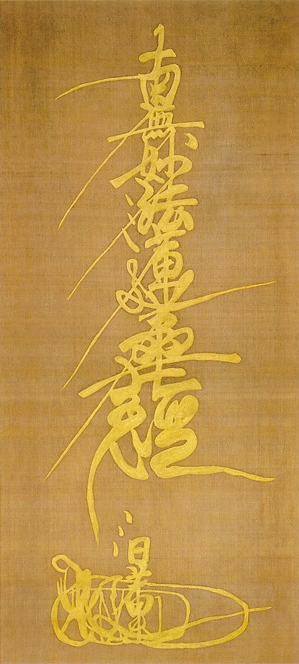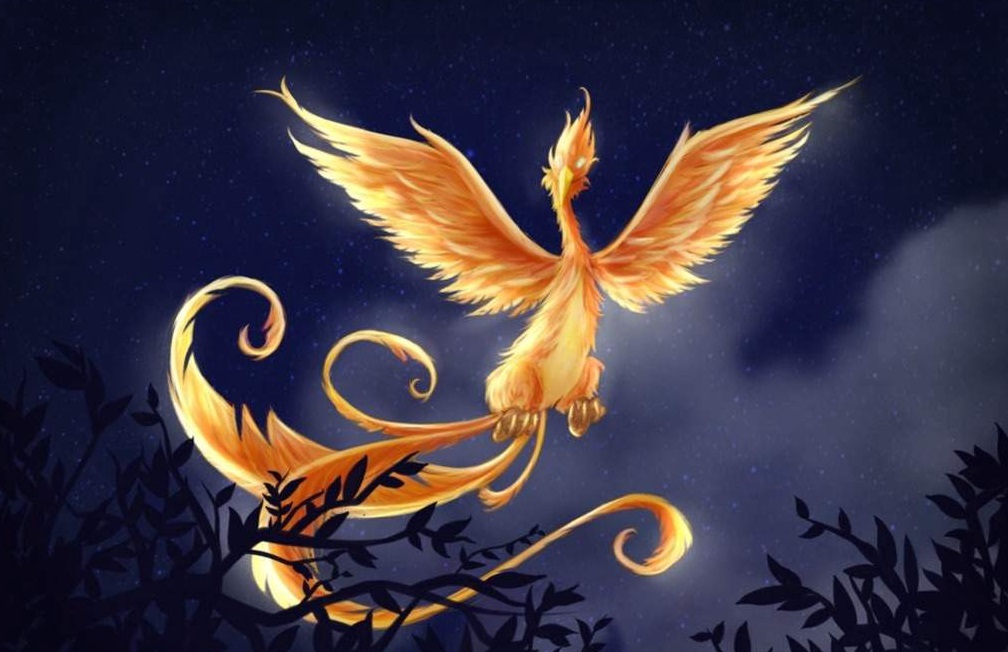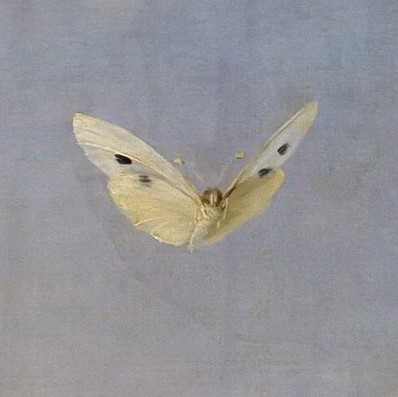FURISODÉ
In his book of Japanese ghost stories, folk tales, and legends, “In Ghostly Japan,” Lafcadio Hearn tells of an incident in a street of small shops selling mainly antiques and old goods. He says,
“Recently, while passing through a little street tenanted chiefly by dealers in old wares, I noticed a furisodé, or long-sleeved robe, of the rich purple tint called murasaki, hanging before one of the shops. It was a robe such as might have been worn by a lady of rank in the time of the Tokugawa. I stopped to look at the five crests upon it; and in the same moment there came to my recollection this legend of a similar robe said to have once caused the destruction of Yedo.”
A “furisodé” is a long-sleeved kimono often worn by unmarried women, indicating they are available for marriage. This minor event evoked in Hearn a memory of an extraordinary legend and the following is a retelling of that legend of the destruction of Yedo by a great fire.
THE SAMURAI DREAM
This legend tells how some two and a half centuries earlier, there lived in Yedo the city of the Shōguns, a lovely young woman. One day as she was attending a festival in the temple, she saw in the crowd the finest looking young samurai she had ever seen or imagined. In her awe of his beauty, she instantly fell in love with him. But, to her dismay, before she could learn his name and who he was, he became lost in the vast, ever-changing throng of people attending the festival. So she sent her servants to search for him or discover his identity, but they could find no trace of him.
Nevertheless, she found the image of the handsome young samurai had become burnt into her mind, remaining clear and lucid in every detail right down to his clothing. As it was a festival, he had been wearing their brightest and most colorful kimonos like herself and everyone else. The young men’s garments were no less gorgeous and colorful than those of the young women. However, it was the upper design of his kimono, the colors and the crest, that had particularly caught her eyes and remained bright and vivid in her mind and made her heart cry out for him. Now, as she considered it in her mind’s eye, it seemed all the more remarkable to the love-struck girl. As she pondered more and more upon the image, the idea grew that she would have a furisodé made to show she was ready for marriage. It would be of similar color and design, with the same crests, and of the same quality silk the samurai of her heart had been wearing. She would wear it around the town in the hope of attracting his attention to her and drawing him into her arms.
NAMU MYŌ HŌ RENGÉ KYŌ! (1)
With this very much in mind, she had a most beautiful furisodé, with long sleeves, made from the finest silk and decorated with the crest she had seen in the most gorgeous of colors and the height of fashion and elegance. Whenever she went out, she would wear it hoping to bring herself to the attention of the samurai of her dreams.
She treasured it so much that when she was not going out, she would hang it in her room and imagine the form of the unknown samurai of her heart was with her. In this dreamy fantasy, she spent hour upon hour for longer and longer. Sometimes she would pray her dream lover would appear and sweep her off her feet, and sometimes she would weep. In this way, between ecstatic fantasy and sad reality, she fluctuated, and she would pray to the gods and Buddhas that they may bring her the samurai of her dreams and that he would love her as much as she loved him. For this purpose, she repeatedly recited the mantra of the Nichiren sect,
“Namu myō hō rengé kyō!”
It proved futile, and all to no avail, for she never again saw the handsome samurai of her dreams. She yearned and pined that he may come and cure her sickened heart, but he never did. Slowly, in lonely misery, pining for her dream lover, she slowly faded, weakened, and died. She was given a Buddhist funeral with all the rites. Her gorgeous furisodé that she had treasured and had been her hope of attracting her dream lover to her was given to the temple that performed the rituals, as was tradition and custom, to dispose of the deceased’s clothing as they saw fit to benefit the temple.
THE HAUNTED FURISODÉ
The furisodé had been made from the finest silk using the best dyes for coloring and showed no sign of wear or the tears that had flowed over it. Its style and design were of the most exquisite taste, and the priest sold it for an excellent price. The garment was brought by a girl of similar age to the lady who had imagined, commissioned, and worn it. Like its previous owner, she was a beautiful girl who wanted to show she was available for marriage. After wearing it for the first day, she fell ill with an unknown sickness and began to act very strangely. She claimed that day and night, a vision of the most handsome samurai she had ever seen appeared before her. It followed her in the day and would manifest before her eyes when she was out. At night it haunted her dreams, and she fell deeply in love with the samurai of her dreams. His vision possessed her, and she knew that for the love of her dream Samauai she would die. Sadly, that is what happened. She withered and failed and died for his love, and for the second time, the beautiful furisodé was given to the temple as custom decreed.
RETURN OF THE HANDSOME SAMURAI
The temple priest remembered selling the beautiful garment and thought no more than how sad events had turned out and sold again. The buyer was another young lady about the same age as the previous owners who wanted it for the same reason. After wearing it for the first time, she complained of seeing a strange but handsome samurai who would suddenly appear nearby when she was out and would intrude upon her dreams. She talked of a handsome samurai whom she had fallen in love with. Although he would always appear close if she reached out to hold him, he dissolved into nothingness. She, too, fell sick, withered, and died unable to obtain the nourishment her dream samurai could give her.
After her funeral, the temple received the furisodé again, but the priest began to feel uneasy and troubled. Nevertheless, the furisodé was sold to another beautiful young woman hoping to attract a husband by wearing it. Like the others, she complained of visitations from a handsome samurai in her dreams and waking life. Like the previous owners, she withered and died, and after her funeral, the furisodé was given to the temple.
The date was the 18th day of the first month of the first year of Meiréki or 1655, and the priest stared at the garment in alarm and revulsion for he knew these tragic deaths were not just coincidence. He now believed the furisodé, although beautiful, was possessed by an evil presence.
THE GREAT FIRE OF THE LONG-SLEEVED ROBE – FURISODÉ-KWAJI
Thinking that destroying the garment would destroy the evil presence, he made a bonfire and cast it to the fire. The beautiful silk was quickly engulfed in flames, but to his astonishment and horror from the inferno, there sprang dazzling tongues of flame which took the shape of the invocation –
“Namu myō hō rengé kyō!”
One by one, these letters leaped onto the temple roof like red hot sparks setting it on fire. Sparks, burning embers, and flames spread to adjacent buildings, and a sea wind carried red hot embers to the roofs and walls of others in the vicinity. Soon the entire street was being consumed by flames, with the sea wind spreading it even further. It was not long before the whole neighborhood was burning and the city in danger of being consumed by the blaze. This was one of the most disastrous catastrophes in Japanese history and became known as the furisodé-kwaji,—the Great Fire of the Long-Sleeved Robe or the Great fire of Meireki.
O-SAMÉ
There are other versions of how the great fire started and the legend and ownership of the furisodé.A tale from a book of stories known as “Kibun-Daijin” gives the name of the girl who had the furisodé as “O-Samé.” She was the daughter of a wine merchant from Hyakushō-machi, in the district of Azabu, whose name was Hikoyemon, a woman of rare beauty and called Azabu-Komachi, or the Komachi of Azabu. According to this book, the temple involved belonged to the Nichiren sect of Buddhism and was called Hon-myoji situated in the Hongo district. Furthermore, the crest that was featured in the design of the beautiful furisodé was a kikyō-flower. Moreover, the tale from the book also claims the handsome samurai was really the spirit of a dragon or water serpent that could appear in human form that once inhabited a lake known as Shinobazu-no-Iké at Uyéno. However, not everyone trusts this version, preferring to think the samurai was human.
ONO-NO-KOMACHI, THE BEAUTIFUL POET,
As often happens, famous people who once existed in history become entangled in legends and folklore of historical events. For example, Komachi or Ono-no-Komachi lived over a thousand years ago and was and still is one of the most celebrated poets and beauties in the history of Japan. She was said to be the most beautiful woman of her era, and her poetry so fine it could move heaven and even bring rain in times of drought.
She was loved by many men, and many were said to have died for want of her love. Sadly, as she grew older, her beauty faded and withered along with her fortune, and she was reduced to wearing rags and begging in the streets. She was said to have died in poverty on the road to Kyoto. Because she was dressed in rags when she died, it was considered shameful to intern her in such a condition, and someone donated a second-hand summer robe to wrap her body in called a katabira. Her grave became known as “Place of the Katabira” (Katabira-no-Tsuchi) and was not far from Arashiyama.
And we can see, as so often happens all around the world, facts, events and real people, become embroiled and tangled up to form legends and myths that feed the fantasies of everyday folk – yet still there remains somethings that cannot be explained and cannot be put down to mere fantasies.
© 23/02/2022 zteve t evans

And
Large Print Paperback – Dimensions : 21.59 x 0.48 x 27.94 cm
All Images Non-color

And
Large Print Paperback – Dimensions 20.32 x 0.15 x 25.4 cm 9 – Images non-color
References, Attributions and Further Reading
Copyright February 23rd, 2022 zteve t evans
- In Ghostly Japan by Lafcadio Hearn
- Furisode Kimono Guide – Japan Talk
- Furisode From Japan // Ohio Kimono
- Furisode – Wikipedia
- Ono no Komachi – Wikipedia
- Cropped from Heiji Monogatari Emaki – Sanjo scroll part 5.jpg – Museum of Fine Arts, Public domain, via Wikimedia Commons
- File:南無妙法蓮華経 by Hasegawa Tohaku (Daihoji Takaoka).jpg – Hasegawa Tōhaku, Public domain, via Wikimedia Commons
- Daderot, CC0, via Wikimedia Commons
- Ono no Komachi – Félix REGAMEY (1844-1907), Public domain, via Wikimedia Commons
























